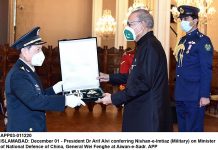Published on: August 16, 2025 1:45 PM

Pakistan has taken the lead in demanding fair access to green financing and technology for developing countries. The call came during a high-level meeting held on the sidelines of the fifth session of the Intergovernmental Negotiating Committee on Plastic Pollution (INC-5.2) in Geneva. Federal Climate Minister Dr. Musadik Malik chaired the session, which included delegates from Bangladesh, Egypt, Malaysia, Sudan, and Tajikistan. The discussions focused on ensuring that the upcoming Global Plastics Treaty supports equal treatment for all nations, especially those most affected by plastic pollution.
Dr. Malik strongly criticized the unequal distribution of green financing around the world. He pointed out that wealthy countries, which consume the most plastic, receive the largest share of climate funds. In contrast, poorer countries face the worst impacts of plastic waste and environmental degradation. He stressed that this imbalance must be addressed in the treaty through fair funding, technology access, and capacity building.
Furthermore, Malik highlighted how climate change and pollution have intensified challenges for countries already struggling with poverty and weak infrastructure. He emphasized the need to support these nations, not just through promises but with practical solutions. According to him, equal partnerships and shared responsibility are key to global progress. The current system, he added, leaves the most vulnerable behind while rewarding the biggest polluters.
In addition to funding concerns, the Pakistani delegation urged the inclusion of strong enforcement and support mechanisms in the treaty. They called for a clear framework for technology transfer, training, and knowledge-sharing. These tools, Malik noted, are essential for developing nations to transition toward cleaner, greener economies. He also highlighted the importance of collective action and long-term international cooperation.
As the negotiations move forward, Pakistan plans to maintain its leadership role in shaping a more just and inclusive treaty. Malik reiterated that countries like Pakistan are not asking for favors—they are demanding fairness. He concluded by urging developed nations to recognize the shared threat of climate change and plastic pollution and to act accordingly, before it’s too late.







.jpg)


